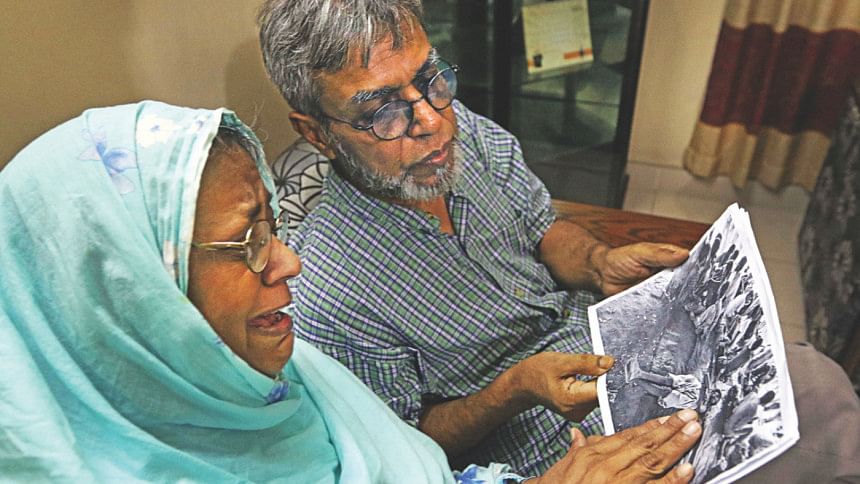Trafficking rides on Rohingya crisis

Dhaka will call for comprehensive efforts to permanently resolve the problems of Rohingyas in today's special regional meeting hosted by Thailand in the wake of escalating Southeast Asian migrant crisis.
A five-member Bangladesh delegation lead by Foreign Secretary Md Shahidul Haque is already in Bangkok to attend the "Special Meeting on Irregular Migration in the Indian Ocean."
Dhaka will also assure that it take back any migrant, if identified as Bangladeshi, from any other the Southeast Asian countries.
For the meet, Thailand has invited representatives from 17 countries directly and indirectly affected by "irregular migration in the Indian Ocean -- Australia, Bangladesh, Cambodia, India, Indonesia, Laos, Malaysia, Myanmar, the Philippines, Vietnam, New Zealand, Papua New Guinea, Sri Lanka, Pakistan, Afghanistan and Iran.
Representatives from the US, Japan and Switzerland will participate as observers along with officials from international organizations including the UN refugee agency, the UN Office on Drugs and Crime and the International Organisation for Migration (IOM).
In the past month, more than 3,000 desperate, hungry people have landed on the shores of Indonesia, Malaysia and Thailand, drawing international attention to a crisis in Southeast Asia.
According to the IOM, an estimated 25,000 Southeast Asian migrants took to the seas in the first three months of 2015.
Minority Rohingya Muslims have been fleeing persecution in predominantly Buddhist Myanmar for decades, and paying human traffickers with flimsy boats to take them away from violence and state-sanctioned discrimination.
And for years, Southeast Asia has quietly ignored the issue, partly because of a policy of not publicly criticising each other's governments. But recently the problem became too big to overlook.
The foreign ministry sources said the Bangladesh delegation at the meeting will highlight the plight of Myanmar's 500,000 Rohingyas living illegally in Bangladesh.
Dhaka strongly believes that until and unless the Rohingya problems are solved, this type of irregular, illegal and risky migration cannot be fully stopped.
Besides, Bangladesh will inform the meeting about the government's all-out efforts to halt illegal migration and steps taken to enforce the legal mechanism to stop any illegal migration from the country.
Dhaka has also ordered the Border Guards of Bangladesh, Coastguard and Navy to strengthen vigilance in the border, especially in its territorial sea in Bay of Bengal so that no such risky boat journey or any illegal migrants go through its border.
ACTION PLAN
Three international organisations will jointly propose a 10-point action plan at the meeting to tackle the Southeast Asia migrant crisis, the United Nations High Commission for Refugees (UNHRC) said yesterday.
The agencies, UNHRC, International Organisation for Migration (IOM) and the United Nations Office on Drugs and Crime (UNODC), have already shared the 10-point action plan with the concerned governments and proposed concrete steps to address the regional challenge of helping people who are risking their lives on smugglers' boats, a spokesperson said.
"UNHCR hopes the meeting on May 29 involving governments will agree on joint action to tackle the humanitarian crisis and address the root of the outflow," said Vivian Tan, UNHCR senior regional public information officer.
This involves coordinating rescue attempts at sea and allowing people to come ashore to receive medical attention and food, she said, according to The Nation.
'TOP PRIORITY'
The rights of those people stranded at sea or in holding camps should be the top priority, said Human Rights Watch (HRW).
"Regional governments should work with the United Nations and others to agree on binding solutions to this human tragedy -- not sweep it under the rug as they have done for years," said Brad Adams, HRW's Asia director, in a statement.
HRW has called for "unimpeded and unconditional access" for internationally-recognised organisations like UNHCR and IOM to rescued migrants and refugees in order to assess their claims for refugee status, CNN reports.
The advocacy group has also called for better search and rescue capabilities now and in the future, and urged participants at the meeting to demand that Thailand, Malaysia, Indonesia and other countries permit disembarkation of seaborne migrants.
HRW says they should "exert pressure on Burma [Myanmar] as the main source of the problem," and provide basic health, education, and other services for Rohingya in an effort to curb illegal migration.
"This regional meeting will only be a success if every government commits to effective search and rescue operations, meeting the protection needs of refugees, prosecuting traffickers, and resolving the root causes that drive these desperate people onto boats," Adams said.
ANY HOPE FOR ROHINGYAS?
Myanmar's government denies the Rohingya citizenship, making them effectively stateless. It views the estimated 1.3 million Rohingya living in dire conditions in western Rakhine state as illegal migrants from Bangladesh. Officials initially said that none of the boat people came from Myanmar, and threatened to boycott the talks if the word "Rohingya" appeared on the invitation. It was left out.
Australian Prime Minister Tony Abbott: "Nope, nope, nope," when asked if Australia would resettle any of the Rohingya or Bangladeshis. "We are not going to do anything that will encourage people to get on boats."
Thailand, Indonesia and Malaysia agree that the key to solving the migrant crisis is addressing "the root cause" -- which means the situation in Myanmar. It's not an easy task when Myanmar officials are loath to even utter the word "Rohingya."
The US is prepared to take a leading role in resettling the most vulnerable Rohingya refugees, according to State department spokeswoman Marie Harf.

 For all latest news, follow The Daily Star's Google News channel.
For all latest news, follow The Daily Star's Google News channel. 



Comments